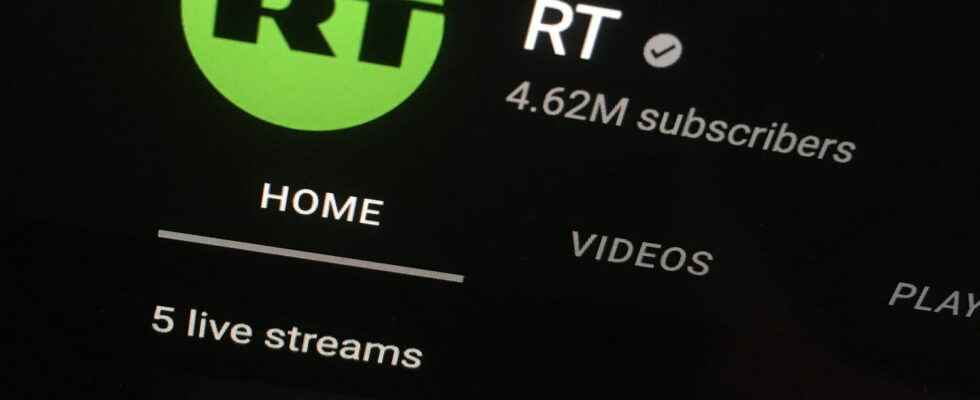RUSSIAN MEDIA. At the unanimous request of the 27 members of the EU, social networks restrict the Russia Today channel and the Sputnik media, accused of being at the service of the Kremlin.
In addition to the economic and trade sanctions taken against Russia by the European Union, the banning of Russian media in the European zone is underway. For Russia Today (RT), the sentence is the prohibition of access to its multimedia content. And for Sputnik, the end of its versions in English, German, French and Spanish. If some social networks procrastinate and sanction one media and not the other, the 4 biggest, Facebook, Instagram, Youtube, and TikTok have taken the plunge by suspending the accounts of the 2. Among the networks that are still missing, Twitter, on which the 2 are still accessible, or the Telegram messaging system which has not yet deleted RT, as indicated European 1.
These prohibitions, legally justified by the “sanctions regime” which is based on a European Council regulation adopted in 2014, follow the speech that Ursula Von der Leyen, President of the European Commission, delivered during a press conference on February 27, and broadcast by France 24. In particular, she indicated that Europe should “ban the Kremlin’s media machine”. She doesn’t hide it, the objective is to prevent Russian state media from “spreading their lies to justify Putin’s war and to sow division in our union”. For Jean-Yves-Le-Drian, Minister for Foreign Affairs, who spoke on the subject in an official speech on March 1, economic and financial sanctions should “put an end to the disinformation disseminated in Europe by Russian propaganda organs”. The harshest words were finally those of the spokesperson for the High Representative of the European Union for Foreign Affairs, Nabila Massrali, who said “doubt that we can qualify them as media”, according to the site EU observesr.
RT and Sputnik banned in Ukraine crisis
The Russian media respond, indignant, like RT France, of a “violation of the rule of law” by these measures going “against the principles of freedom of expression”, in a article published on his website. Faced with the emergency, the media even held a general meeting bringing together employees and management on 1er March. If the bankruptcy of the management of RT seems likely, as the journalist claims Aude Lancelinthe live channel was still broadcast on the RT France site and the Sputnik site still accessible this Wednesday, March 2.
In fact, these networks are not yet inaccessible in France where the suspension of the RT television channel must be validated by ARCOM, the French media regulator. This is what Laurent Lafon, the president of the Senate culture committee, asked for in a letter sent to the president of Arcom and Roselyne Bachelot on February 24, explains Public Senate. The legislative text recording this decision will be published this Wednesday, March 2: the text will then come into force, making the Russian media definitively inaccessible.
News controlled by the Kremlin?
If Margarita Simonian, the editor-in-chief of RT was indignant in 2014: “Deutsche Welle, the BBC or France 24 are well funded by states, what difference does it make with us?”, the comparison is misleading, given the low degree of independence of this media which advocates a “Russian point of view on world events”, as indicated on its official site. RT claims an alternative vision of the news, competing with that of the mainstream media to “break the monopoly of the Anglo-Saxon media”, said Putin in 2013. If the Russian media seem inaccessible, it is therefore for their rejection of the western establishment, explains the Media review. Beyond ideology, there is the problem of the direct financing of the Kremlin which, as reported Free lunchthe European Union estimates to be up to 430 million euros.
